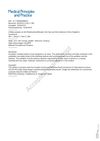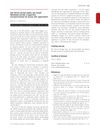 9 citations,
July 2011 in “Scientific Reports”
9 citations,
July 2011 in “Scientific Reports” Changes in the HR gene have influenced hair growth and may lead to hair loss conditions in humans.
 9 citations,
January 2006 in “Cutaneous and ocular toxicology”
9 citations,
January 2006 in “Cutaneous and ocular toxicology” L-cystine, D-pantothenat, and miliacin together significantly boost keratinocyte growth and metabolism.
 7 citations,
December 2020 in “Pharmaceutics”
7 citations,
December 2020 in “Pharmaceutics” A mix of tocopherol acetate and L-menthol helps grow hair better than using them separately or using minoxidil.
 7 citations,
May 2020 in “Trends in molecular medicine”
7 citations,
May 2020 in “Trends in molecular medicine” The document concludes that the immune-inhibitory environment of the hair follicle may prevent melanoma development.
 7 citations,
March 2019 in “Journal of cosmetic dermatology”
7 citations,
March 2019 in “Journal of cosmetic dermatology” African hair has the most lipids, while Caucasian hair is more hydrated and stronger.
 7 citations,
November 1987 in “Pharmacotherapy: The Journal of Human Pharmacology and Drug Therapy”
7 citations,
November 1987 in “Pharmacotherapy: The Journal of Human Pharmacology and Drug Therapy” Minoxidil can help thicken hair in some people with male pattern baldness, especially if used early and continuously.
 7 citations,
May 1978 in “International Journal of Dermatology”
7 citations,
May 1978 in “International Journal of Dermatology” Recent hair loss research shows some progress, especially in understanding male pattern baldness, but effective treatments for many types of hair loss are still lacking.
 6 citations,
December 2018 in “Medical principles and practice”
6 citations,
December 2018 in “Medical principles and practice” Using hair dye may slightly increase the risk of non-Hodgkin's lymphoma, especially with long-term use.
 6 citations,
July 2017 in “Biochemical and Biophysical Research Communications”
6 citations,
July 2017 in “Biochemical and Biophysical Research Communications” The Hairless gene is crucial for hair cell development, affecting whether skin cells become hair or skin and oil gland cells.
 5 citations,
April 2021 in “Biomedicines”
5 citations,
April 2021 in “Biomedicines” The engineered skin substitute helped grow skin with hair on mice.
 5 citations,
November 2011 in “Expert Review of Dermatology”
5 citations,
November 2011 in “Expert Review of Dermatology” The document concludes that early diagnosis and a comprehensive treatment plan are crucial for managing hair loss in children, with a focus on both medical and psychological support.
 5 citations,
September 2010 in “Cancer Prevention Research”
5 citations,
September 2010 in “Cancer Prevention Research” The research suggests new treatments for skin cancer could target specific cell growth pathways.
 5 citations,
March 2001 in “Journal of biomechanics”
5 citations,
March 2001 in “Journal of biomechanics” Growing hairs are easier to pull out than resting hairs due to different anchorage strengths.
 4 citations,
October 2022 in “Frontiers in public health”
4 citations,
October 2022 in “Frontiers in public health” Cadmium chloride pollution can cause skin disorders, speed up aging, and prevent hair growth.
 4 citations,
March 2014 in “The FASEB Journal”
4 citations,
March 2014 in “The FASEB Journal” The HIF-2α/ARNT complex is important for hair follicle development by controlling cell growth.
 4 citations,
July 2012 in “Genesis”
4 citations,
July 2012 in “Genesis” The Megsin-Cre transgene is a new tool for genetic manipulation in the skin and upper digestive tract.
 4 citations,
January 2012 in “Elsevier eBooks”
4 citations,
January 2012 in “Elsevier eBooks” The document concludes that various skin conditions have specific treatments, ranging from antihistamines for urticaria to surgery and medication for tumors and chronic skin diseases.
 4 citations,
July 2001 in “Personality and Individual Differences”
4 citations,
July 2001 in “Personality and Individual Differences” Men with moderate hair loss had the best spatial thinking, and long-term DHT might affect cognition.
 4 citations,
January 1987 in “Annual reports in medicinal chemistry”
4 citations,
January 1987 in “Annual reports in medicinal chemistry” New treatments for skin diseases are more effective and patient-friendly, but many still lack a cure.
 3 citations,
May 2017 in “British journal of dermatology/British journal of dermatology, Supplement”
3 citations,
May 2017 in “British journal of dermatology/British journal of dermatology, Supplement” Certain cells around hair follicles help improve skin regeneration for potential use in skin grafts.
 3 citations,
March 2010 in “Dermatologica Sinica”
3 citations,
March 2010 in “Dermatologica Sinica” A Taiwanese patient had hair loss and skin bumps without the usual gene mutation, suggesting other genetic factors might be involved.
 3 citations,
November 1999 in “Journal of Cutaneous Medicine and Surgery”
3 citations,
November 1999 in “Journal of Cutaneous Medicine and Surgery” AGA is a genetic, hormonal hair loss treated with finasteride, minoxidil, and supplements, but new compounds are being developed.
 2 citations,
December 2022 in “Journal of toxicologic pathology”
2 citations,
December 2022 in “Journal of toxicologic pathology” Skin structure complexity and variability are crucial for assessing skin toxicity in safety tests.
 2 citations,
January 2014 in “Springer eBooks”
2 citations,
January 2014 in “Springer eBooks” The book details skin conditions in older adults, their link to mental health, cancer treatment importance, hair loss remedies, and managing autoimmune and itchy skin.
 2 citations,
December 2013 in “Veterinary dermatology”
2 citations,
December 2013 in “Veterinary dermatology” Three dogs with a rare skin condition improved with treatment.
 1 citations,
January 2024 in “Curēus”
1 citations,
January 2024 in “Curēus” Upadacitinib significantly improved a man's severe scalp condition when other treatments failed.
 1 citations,
December 2023 in “Egyptian Journal of Veterinary Science”
1 citations,
December 2023 in “Egyptian Journal of Veterinary Science” Astragalus polysaccharides nanogel heals wounds better than Gold-Silver nanocomposite gel.
 1 citations,
April 2021 in “Current Stem Cell Reports”
1 citations,
April 2021 in “Current Stem Cell Reports” Eating less can improve stem cell function and increase lifespan.
 1 citations,
July 2020 in “bioRxiv (Cold Spring Harbor Laboratory)”
1 citations,
July 2020 in “bioRxiv (Cold Spring Harbor Laboratory)” Removing centrosomes from skin cells leads to thinner skin and stops hair growth, but does not greatly affect skin cell differentiation.
 1 citations,
November 2018 in “bioRxiv (Cold Spring Harbor Laboratory)”
1 citations,
November 2018 in “bioRxiv (Cold Spring Harbor Laboratory)” Signals from skin cells controlled by Rac proteins help turn certain precursor cells into white fat cells.






























